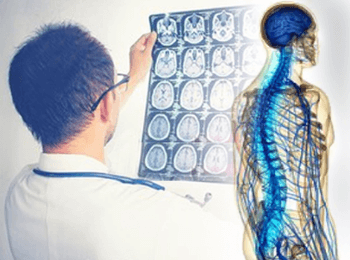
Overview
At Sarvodaya, Centre for Brain & Spine, surgery on the brain, spinal cord, skull and the bony spinal column is done with highly advanced technologies and expert neurosurgeons. With technology becoming the prime driver of today’s healthcare, coupling with expert doctors are also important, and in case of neuro care, experience and efficiency speaks. At Sarvodaya Hospital, our neuro surgery team is supported by modern Neuro-radiology service, Neuro-intensive care facility, medical and radiation oncology services providing the best outcome across the globe.
At Sarvodaya Hospital, Faridabad we perform Neuro-Navigation Guided Craniotomy, a navigation screening protocol which assists the surgeon in planning tumor resection. Once registration is completed, the computer can show the relationship of the surgical instruments to the imaged brain in real time. This enables the doctors to perform the surgery efficiently and perfectly and these processes help patients to restore movements and functions fast.
For spine we perform Minimally Invasive Spine Surgery (MISS) which involves advanced technology and innovative techniques to treat back and neck pain caused by a variety of spinal disorders. The procedure involves a small incision and faster recovery time. Our medical services are committed to offering a pain-free lifestyle to each individual by evaluating their medical conditions and treating them accordingly.
We thrive to bring in new technologies at the Centre to ensure that all the patients receive excellent treatment by including advanced technologies like enhanced Defibrillator, Ventilator, ABG, Monitor, USG, X-Ray, CT, MRI, Advanced C Arm, Advanced Microscope, and Advanced Drill.
At Sarvodaya Hospital, Sec-19 we are supported with the highly advanced latest technology and medical equipment, available at Sarvodaya Hospital, Sec 8.
- Navigation Assisted Brain Tumor Surgeries - Neuro-navigation has become an ubiquitous tool in the surgical management of brain tumors. Neuro-navigation provides intra-operative orientation to the surgeon, helps in planning a precise surgical approach to the targetted lesion and defines the surrounding neuro-vascular structures. Incorporation of the functional data provided by functional MRI and magnetoencephalography (MEG) with neuro-navigation helps to avoid the eloquent areas of the brain during surgery. An intra-operative MRI enables radical resection of the lesions, the possibility of immediate control for tumor remnants and updates of neuro-navigation with intra-operative images to compensate for brain shift.
Benefits of Neuro Navigation Guided Surgery
- Supports Minimal Access Approach
- Improve Surgery Outcomes
- Pinpoint Accuracy Real Time Orientation of Surgery
- Reduces Operating, Hospitalization and Recovery Time
- Pituitary Tumor Surgeries- The main treatment for many pituitary tumors is surgery. How well the surgery works depends on the type of tumor, its exact location, its size, and whether it has spread into nearby structures.
- Deep Brain Stimulation- Deep brain stimulation (DBS) is a surgery to implant a device that sends electrical signals to brain areas responsible for body movement. Electrodes are placed deep in the brain and are connected to a stimulator device. Similar to a heart pacemaker, a neuro-stimulator uses electric pulses to regulate brain activity.
- Awake Craniotomy- Awake brain surgery, also called awake craniotomy, is a type of procedure performed on the brain while you are awake and alert. Awake brain surgery is used to treat some brain (neurological) conditions, including some brain tumors or epileptic seizures
- Endoscopic Brain Surgeries- Endoscopic brain surgery is a procedure used primarily to treat brain tumors. It is considered a minimally invasive brain surgery that allows neurosurgeons to identify and treat conditions that are deep within the brain
- Skull-Base Surgeries- Skull-base surgery is surgery that is done to remove a tumor or other growth at the base, or bottom, of the skull. Minimally invasive skull-base surgery, also called endoscopic skull-base surgery, is a surgical technique that lets doctors do this delicate surgery through the nose.
- Minimally Invasive Brain Surgeries- At Sarvodaya Hospital, Faridabad minimally invasive brain surgeries are done using a tubular retractor system that substantially lowers the risk of damaging eloquent tissue during removal of deep-seated lesions. The procedure can be an option for selected patients with subcortical high-grade glioma, metastatic brain tumors or vascular lesions.
- Conventional Spine Surgery- We offer conventional spine surgery or open back surgery for severe back pain conditions or when other conservative therapies have not worked to relieve the patients of their pain.
- Minimally Invasive Spine Surgery-This is a less invasive surgery in comparison to traditional surgery where we use technology-enhanced devices to complete the surgeries through a small incision, leaving no ugly scars, and allowing the patient to have a speedy recovery. This is recommended for most of our patients so that they can go back to their routine life as fast as possible.
- Stereotaxic Procedures- This is a minimally invasive type of surgery done to target small areas inside the body, to perform procedures such as ablation, biopsies, stimulation, lesion, injection, implantation, radiosurgery, etc.
- Comprehensive Neurotrauma Management- With modern facilities and a team of experts, the centre provides complete care for neurotrauma along with critical care for any spinal conditions.
- Neuro-Vascular Surgery- The centre is equipped to treat a variety of conditions and vascular malformations of the brain, spine and peripheral nerves.
- Paediatric Neurosurgery- We also have a dedicated neurosurgery facility for children to treat their spinal conditions both congenital & due to some accident or trauma.
- Cervical Spine Treatment- We offer Anterior Cervical Discectomy and Fusion with instrumentation where the cervical disc and/or spur are removed during the procedure. After removal of the disc, it is fused with instrumentation. Insertion of artificial discs for cervical disc herniation and/or degeneration is also performed here with extreme caution & care. We also offer Modafinil Posterior Cervical Spine Surgery for Cervical Canal Stenosis. Decompression & Posterior Fusion of the Cervical Vertebrae are among some of the other procedures undertaken at the centre.
- Thoracic Spine Pain Treatment- A Discectomy is performed where a portion of the disc is removed from the spine to release the pressure on the nerve, thereby relieving a patient of their thoracic spine pain. This pain could arise due to multiple reasons including, muscular disorders, bad lifestyle habits & routines, bad posture, etc.
- Kyphoplasty/Vertebroplasty for Fractures- This is a minimally invasive treatment in which orthopaedic balloons are used to gently elevate the fractured vertebrae in an attempt to return it to the correct position, and healing the fracture thereafter.
- Microdiscectomy (Minimally Invasive Spine Procedure)- This is an operation on the lumbar spine that is performed using a very small incision and removes only the portion of the ruptured disc that is pinching the spinal nerve causing pain. The surgery is performed under an operating microscope.
- Decompressive Laminectomy with or without Fusion and/or Instrumentation- This surgery is done to treat spinal stenosis and relieve pressure on the spinal cord or spinal nerves. Spinal Stenosis is a common condition that occurs when the small spinal canal, which contains the nerve roots & spinal cord, becomes compressed, causing a “pinching” of the spinal cord and/or nerve roots. This could lead to severe pain, cramping, numbness and serious discomfort. A Laminectomy removes the bone and/or thickened tissue that is narrowing the spinal canal causing the squeezing in the first place. Sometimes along with it, a foraminotomy is also performed to relieve the pressure on the existing nerve root. This procedure is done by surgically cutting into the back.
- Posterior and Anterior Lumbar Interbody Fusion- In this procedure, the surgeon joins (fuses) two lumbar vertebrae, which helps stabilize the vertebrae in this part of the spine.
- Pain management- We have a Spinal Cord Stimulator used for chronic pain management. A small stimulator sends signals to your spinal cord to keep the pain messages from being sent to your brain, thereby reducing the feeling of pain.
- Carpal Tunnel Release- It is a surgery performed to treat Carpal Tunnel Syndrome, which is a strong pain and weakness in the hand caused by pressure on the median nerve at the wrist.
- Ulnar Nerve Transposition- Ulnar Nerve Transposition moves the affected nerve to relieve pain and pressure. A new tunnel is created for the nerve during this procedure.
- Peripheral nerve trauma surgery- With the help of a nerve stimulator, the pathological area is found & treated accordingly. The finest suture material which is even thinner than a hair is used, to ensure that the wound is healed perfectly and does not cause any obstruction to an individual’s daily life post-surgery.
- Peripheral nerve sheath tumour- Removal of a tumour from a peripheral nerve is sometimes challenging and the goal is the total removal of the tumour without altering the normal function of the nerve. Tumours can be benign or malignant (cancerous). A malignant tumour is managed with the help & support of a team of Experienced Oncologists from the Sarvodaya Cancer Institute.
- Tethered Cord- In this surgery, the tethering of the spinal cord is removed under the microscope, allowing normal growth of the spinal cord by restoring the function of the limbs.
At Sarvodaya Hospital, Sec-19 we are supported with the highly advanced latest technology and medical equipment, available at Sarvodaya Hospital, Sec 8.
Neuro-Navigation: Neuro-navigation is an advanced surgical technology utilized by neurosurgeons to navigate within the skull or vertebral column during surgery. This allows precision based diagnosis and treatment for critical brain & spinal conditions.
Scanning Facilities: We have some excellent scanning facilities for accurate diagnosis including an ultra-modern Digital X-Ray, CT scan and MRI scan, which offer high-quality imaging & radiology support for surgeries detecting maximum issues concerned to brain & spine.
Advanced Drill: Our team relies on a High-speed pneumatic surgical drill for drilling simple burr holes or for creating larger openings in the skull enabling our neurosurgeons to perform critical brain surgeries with ease.
Advanced Microscope: The advent of advanced microscope in the operating room has revolutionized neurosurgery. They provide high-quality optics and engineering for cranial (skull), spine, multi-disciplinary and other microsurgery disciplines. These advanced surgical operating microscopes support our team to push the boundaries of surgical care and bring surgical experience to the next level.
Intra-operative Neuro Monitoring: Intraoperative Neurophysiological Monitoring (IONM) or intra-operative neuro monitoring is the utilization of electrophysiological procedures to precisely detect the functional integrity of nerves, spinal cord and parts of the brain during surgical methods. IONM is used to reduce the risk for induced damage to the nervous system, and to provide functional guidance to the neurosurgeons.
CUSA (Cavitron Ultrasonic Surgical Aspirator): It is an advanced surgical device which uses ultrasound energy to dissect tissues. It has benefits like less blood loss, improved visibility and less collateral tissue damage. It differentiates pathologic tissue from normal tissue, thus preventing damage to healthy parenchyma. Ultimately leading to minimal brain and spinal cord disruption, reduced surgical time and improved patient outcomes.



